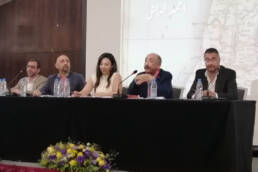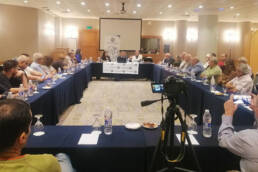[wonderplugin_carousel id=”18″]
The Center for Arab Unity Studies hosted on Thursday July 8th, 2021 at its headquarters in Beirut, the Palestinian struggler and thinker, Munir Shafiq- “Abu Fadi”- in an interesting dialogue that was broadcast live via Zoom and the center’s Facebook page. The Director-General of the Center, Luna AbuSweirah, welcomed “Abu Fadi”, who is a member of the General Secretariat of the Arab National Conference, Secretary-General of the Conference of Palestinians Abroad, former Director-General of the Planning Center in the Palestine Liberation Organization, and former Secretary-General of the Islamic National Conference.
The webinar, was moderated by Walid Sharara, who is the Editorial board member of the Lebanese newspaper Al-Akhbar, a writer and political analyst. This webinar came after the Center published Shafiq’s memoirs in a book entitled Journey through the Embers Pages from Mounir Shafiq’s Memories on May 2021. The webinar was attended by a large group of writers, academics, interested parties and friends and lasted for more than an hour and a half , also including a series of interventions and questions from participants. It discussed the various stages of Shafiq’s political life, starting from the 1950s and his communist experience, passing through his Nasserist and patriotic experience, to his Islamic inclinations and the establishment of “Al-Jarmaq” battalion year 1973.
Walid Sharara began the dialogue by asking his guest about his “interpretation of the Nakba,” explaining that Shafiq had always considered the Nakba to be “inevitable”. The writer in return assured that “when the Nakba occurred, the Arab nation was shackled by external control that imposed fragmentation, and controlled armies… and that was after the First World War, when the Arab countries were under direct colonial military rule or subject to some treaties… on the other hand, Haganah received international support”. Shafiq added “It was not possible for the Palestinian people at that time to escape from this catastrophe”.
Regarding joining the Jordanian Communist Party when he was sixteen years old, Shafiq explained that he was influenced by his Marxist father’s experience, as well as the image and policy of the Communist Party then, which was “strong and does not fear prisons”, as he said. Shafiq also discussed at length the story of the “German investigator” whom he mentioned at length too in his book. He also touched on the reasons that made him take a critical stance on the party, leading to his joining Fatah movement after that.
Sharara also asked his guest about the conflict within Fatah following the growth of a political current that supported settlement with the Israelis. Shafiq explained that at the time he found a Palestinian-Palestinian conflict useless, since settlement was not in reach. So, he chose military confrontations with the enemy without finger pointing towards Fatah’s leadership and accusing it of treason.
Regarding his Islamic experience, Shafiq considered that the settlement that Sadat signed in 1979 with the Zionist entity was a “big blow to the Arab liberation movement”, followed by the withdrawal of Fatah movement from Lebanon. He added that “The Palestinian resistance found, then, an alternative in Iraqi and Libyan support before the war emerged between Iraq and Iran”. He continued “the Palestinian resistance received a huge support from the rise of the Islamic Revolution in Iran, so the continuation of the resistance necessitated to open up to the Islamists leaving an open door for them to join the ranks of the Palestinian revolution”.
At the end, Shafiq considered that the resistance today is in its finest state, praising the Resistance’s achievements in Lebanon 2006 and Gaza 2008. He also attributed this to the “aging” of the Zionist entity, the rise of the “Axis of Resistance”, and the decline of the unilateral role of the United States of America. He stressed “the need to stop the Arab collapse by unity, which may be manifested at a minimum by a common Arab market”. In light of this collapse, “the only bright thing today is the resistance”, he said, but he is optimistic about the nation’s future, stressing the importance of breaking external interventions.
Order the book now by clicking the following link:
Journey through the Embers Pages from Mounir Shafiq’s Memories
You may also watch the full webinar here:
https://www.facebook.com/CausCenter/videos/277752520809093
#CAUS #centre_for_arab_unity_studies #Mounir_Shafiq #webinar #memoirs_of_Munir_Shafiq
مركز دراسات الوحدة العربية
فكرة تأسيس مركز للدراسات من جانب نخبة واسعة من المثقفين العرب في سبعينيات القرن الماضي كمشروع فكري وبحثي متخصص في قضايا الوحدة العربية
We appreciate your support
SUPPORT THE CENTRE FOR ARAB UNITY STUDIES
The Centre is reaching out for its friends and readers for support, whether by ordering our publications and paying for them in hard currency, or through donations. The Centre welcomes any support to boost its resiliency, to ensure its survival, the continuation of its legacy and its commitment to tackle issues facing the Arabs and the Arab world.



